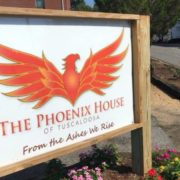Phoenix House Of Tuscaloosa Planning Statewide Capital Campaign
TUSCALOOSA, AL — The Phoenix House of Tuscaloosa, a state-certified residential rehabilitation facility, is hoping to expand upon its noble mission of offering treatment to those suffering from addiction.
To accomplish its ambitious goals, the nonprofit is actively planning a new statewide capital campaign geared toward securing the funding to expand services and, hopefully, expand its residential options for clients in the future.
“We are trying to reach a means to be able to enhance our capabilities,” Phoenix House of Tuscaloosa Executive Director Ted Sexton told Patch, explaining that a statewide campaign was necessary because the nonprofit serves clients from all over Alabama. “There’s no long-term program in Alabama, no three-year program for treatment.”
Located in the former West End Christian School, the Phoenix House of Tuscaloosa was founded in the late 1960s and has operated as its current incarnation since 1972. Clients utilizing the services offered at The Phoenix House typically come from the court system, jails, and the local homeless population.
Renovations are underway at current The Phoenix House location, with improvements being made to rooms occupied by three or four clients each.
The Phoenix House is funded through private donations, the United Way of West Alabama, The Alabama Department of Mental Health, First United Methodist Church of Tuscaloosa, and First Presbyterian Church of Tuscaloosa.
At present, the nonprofit is serving 30 clients, most of whom were given court orders for treatment.
“There are people out there who don’t understand that addiction is a disease,” Sexton said. “There are people out there who think folks fall into substance abuse or drinking because they made terrible decisions. While that might be true, 9 times out of 10, there’s a cycle and that is a very clear pattern here.”
Sexton, the former longtime sheriff of Tuscaloosa County, possesses a unique perspective as it relates to issues in the community and went on to explain how recovery is different for every individual who comes through the door.
And while many have finished the program and gone on to live clean, productive lives, Sexton said certain triggers in the community — such as establishing credit or achieving financial independence — have become points of focus for case managers at The Phoenix House in an effort to reduce the chances of their clients relapsing once they are their own.
“They might get out of here and do well, but then the stress comes back and they are back into the cycle of addiction again,” Sexton said. “It’s always something within the community that sets them back off.”
In an effort to further build out its offerings, The Phoenix House capital campaign will aim to lay the foundation for a third step in the nonprofit’s approach to treatment.
Admissions to Phoenix House
Unemployed upon admission to Phoenix House — 83%
High school dropouts and no GED — 40%
Unmarried — 87%
Females reporting a history of abuse — 90%
Those with children — 70%
Those living below the poverty line — 73%
Those under court or legal supervision — 80%
Individuals without independent living environments — 90%
Individuals with household incomes below $25,000 — 90%
Discharge statistics
Those who completed the Alabama Ready to Work Program — 100%
Those who left the program with gainful employment — 90%
Individuals who have been discharged and not been arrested in the past 90 days — 100%
Those reporting that their legal status improved — 99%
Individuals participating in recovery activities — 100%
Those who report improving their connection to the recovery community — 100%
Individuals who have been screened and offered an opportunity for individual therapy services — 100%
Indeed, the first step in treatment for The Phoenix House focuses on the initial 90 days for the client, with an emphasis placed on regimented schedules consisting of recovery activities, employment assistance, and case management.
Following the first 90 days, the program then transitions for the remainder of the first year of treatment to place an emphasis on housing, full-time employment, continued recovery, and help on the legal end of cases such as graduating from drug court programs, remaining in compliance with court orders, and the reinstatement of driving privileges.
But it’s the treatment after that crucial first year that comprises the goals of The Phoenix House’s statewide capital campaign.
Sexton reiterated the lack of a three-year residential recovery program in Alabama — a void the nonprofit hopes to fill through its expansion plans.
“This will be a means to let you integrate back into the community, but you’ll still have a safety net, you’ll still have case management, we’ll still be making sure you’re going to meetings and in the 12-Step program,” he said. “So, by the time you leave here, you should be down to a 10% to 20% chance of relapse and if you can make it to five years, you’re just about there.”
While the second step in the nonprofit’s approach to treatment focuses on employment requirements and placing clients in one of its eight sober-living houses nearby, the planned third step would expand upon this approach.
The most crucial component of this hypothetical expansion is the ongoing talks for The Phoenix House of Tuscaloosa to purchase the former Masters Inn property on McFarland Boulevard.
In January 2022, the City of Tuscaloosa forced the motel to surrender its business license, which came ahead of Richard Henry purchasing the property and having it rezoned from commercial to residential.
Sexton said while talks continue regarding the possibility of purchasing the former motel, the property represents an ideal location for the nonprofit to grow its services for long-term clients.
If successful, the new location, which is already properly zoned for what the nonprofit needs, would offer services for clients who have gained permanent employment and may be looking to establish credit.
Clients will also have access to financial literacy education and help to get credentials such as a GED, in addition to help with an exit plan for any outstanding legal issues.
Sexton then explained that clients after their first year of treatment will pay a fee for housing, but will not have to sign a lease due to coming to The Phoenix House for treatment. This spares the nonprofit from being involved in the eviction process.
“This will offer long-term treatment options for judges,” Sexton said. “Then, that 18-year-old burglar that has a substance problem, rather than send him to jail or send him to the state to be a better criminal, you can send them to us and they know they are here for three years.”






